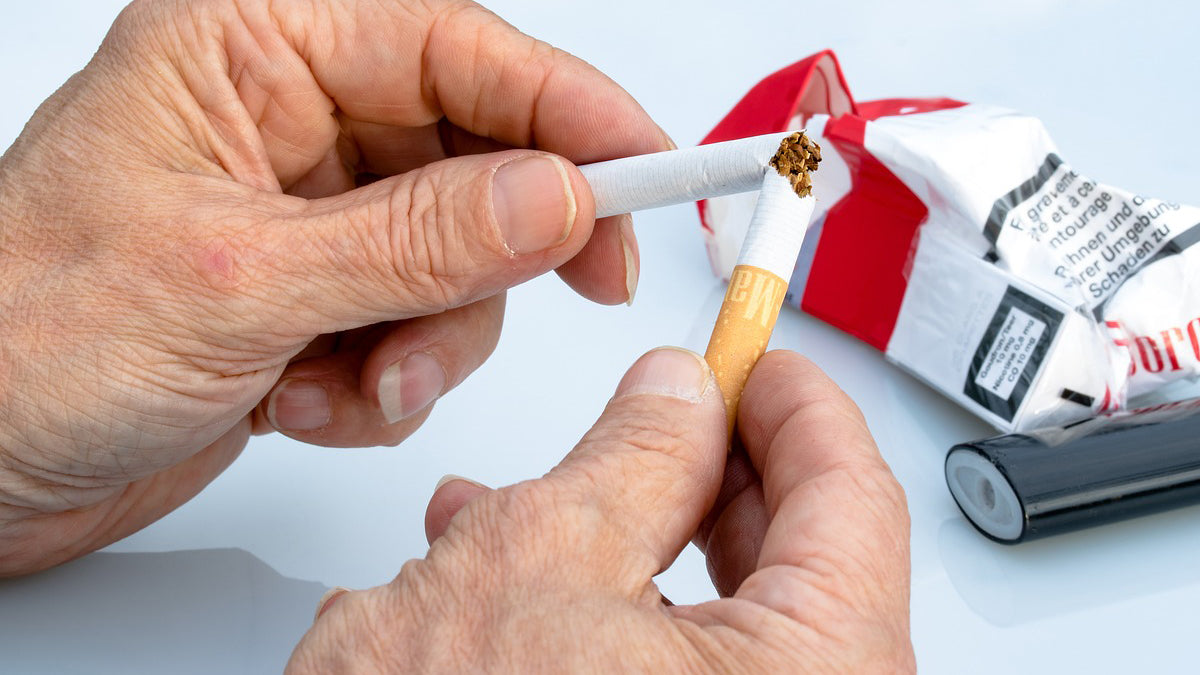Quitting Tobacco and Your Oral Health: 6 Reasons To Quit Today
Smoking is not just a health hazard but a major party pooper for your oral health too! However, the power to reverse the damage and embrace better oral health lies in your hands. Here's all you need to know about quitting tobacco and its magical effect on oral health. From bidding adieu to bad breath and yellow teeth to conquering gum disease and even unlocking a supercharged sense of taste, we've got deets on all the reasons why kicking that smoking habit is a game-changer.
The Link Between Tobacco and Your Oral Health

Many people don't realise the damage that smoking and chewing tobacco does to their mouths, gums and teeth. These products expose the mouth to dangerous carcinogenic chemicals. The deep yellowish tinge that smokers have or the patina of reddish brown that chewers' teeth possess is all due to persistent tobacco consumption. In severe cases, it can lead to tooth loss and even mouth cancer for some.
But how do tobacco products lead to oral health issues?
- It increases the presence of harmful bacteria in your mouth, putting you at a higher risk of infections
- Tobacco interferes with the normal function of gum tissue cells, making them more susceptible to damage and infection
- Tobacco impairs blood flow, making it harder for your body to heal
It's important to note that the oral effects of smoking can vary from person to person, depending on factors like frequency and duration of use. Quitting tobacco is crucial to protecting your oral health and giving your mouth a chance to heal.
Tobacco Messes with Your Oral Health - What Can This Lead To?
- The Infamous Smoker's Mouth
Our teeth show the most visible effects of smoking. Varied levels of discolouration, unpleasant breath and tartar and plaque buildup are some common oral health issues due to smoking. Some people may experience cavities, mouth sores and gum disease.
- Gum Disease
According to studies, smokers are twice as likely to develop gum disease. It can be of two types-
1. Gingivitis: This occurs when plaque and tartar set up camp under the gums, causing inflamed and tender gums that bleed. Ouch!
2. Periodontal Disease: Think of this as the supervillain version of gingivitis. When gingivitis is untreated, it can transform into periodontitis, an inflammatory infection that breaks down gum tissues. If not treated, one may experience receding gums, deep pockets, bone loss, and a VIP pass to other serious infections.
- Cancer of the Mouth and Throat
Tobacco and cancer are like the worst partners in crime, targeting the mouth and throat. Research suggests smokers are six times more likely to end up with mouth, lip, tongue, or throat cancers. Common symptoms include swollen lumps, stubborn sores, swallowing troubles, or mouth-throat bleeding that just won't go. Your dentist can spot the symptoms early on, so keep getting regular check-ups done.
How Are Quitting Tobacco & Oral Health Connected?
Quitting tobacco can significantly improve your oral health. Here's how:
It doesn't matter how long you've been smoking, quitting cigarettes dramatically reduces the chances of tooth loss and a whole range of oral health problems like those we touched upon earlier. Even cutting down on smoking is beneficial in reducing health risks. And, once you quit, the health risks shrink over time until they are equivalent to the level of a non-smoker.
2. Quitting Tobacco Boosts Oral Gum Health
You'll notice a significant improvement in your gum health compared to those who are still smoking once you quit. The effects won't be instantaneous, but most people show healthier gums a year after quitting.
3. Another Benefit of Quitting Tobacco On Oral Health: Better Sense of Taste & Smell
Chewing tobacco and smoking both numb the taste buds. When you quit tobacco, in a few days your sense of smell and taste return in full throttle. Quitting enhances sensitivity to taste and smell considerably, leading many ex-tobacco consumers to be surprised at how much flavour they have missed out on in the years between when they started and they quit.
4. Important Effect of Quitting Tobacco On Oral Health: Better Breath
Smoking leads to a dry mouth that makes the mouth vulnerable to the proliferation of bacteria. This often leads to a typical, slightly unpleasant smoker's breath. Most tobacco quitters experience fresh breath and higher confidence levels when interacting with others.
5. Improved Blood Circulation To Oral Tissues After Quitting Tobacco
On quitting tobacco, the capillary and arteriolar blood flow improves. This helps delay facial wrinkling and premature ageing. You will look more radiant and fresh! And once blood circulation in your oral tissue improves, one can also go for dental treatments like orthodontic appliances, crowns or surgical interventions for implants or gum surgery if your dentist feels you need it.
6. Quitting Tobacco Helps Improve Teeth Discolouration
Those stubborn nicotine stains resistant to every oral health treatment you have tried? Once you break free from smoking or chewing tobacco, you can work towards improving the colour of your teeth. A sparkling smile is just a decision away!
Conclusion: The Next Steps
If you're a smoker, consider embarking on the journey to quit tobacco now. You can do this either by yourself or with the help of outside resources like a therapist, a doctor or a digital app. Needless to say, the support of your family & friends will help you achieve success. Let your smile (teeth and gums) light up the world!















